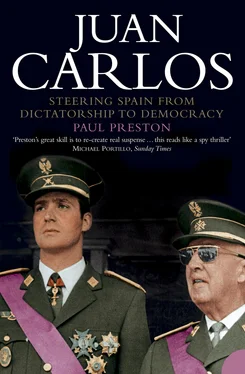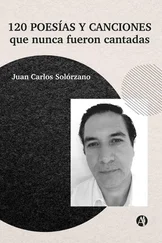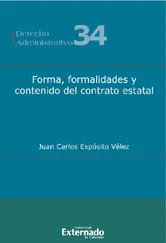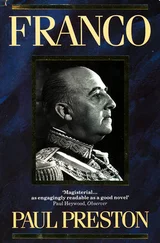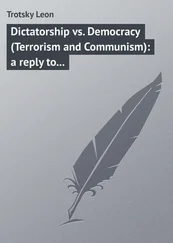In response to the approaches made to the Germans by Don Juan’s supporters, Franco wrote an impenetrably convoluted letter to him at the end of September 1941. The tone was deeply patronizing: ‘I deeply regret that distance denies me the satisfaction of being able to enlighten you as to the real situation of our fatherland.’ The gist was a tendentious summary of Spain’s recent history which permitted Franco to combine the apparently conciliatory gesture of recognizing Don Juan’s claim to the throne with the threat that he would play no part in the future of the regime if he did not refrain from pushing that claim. What was quite clear was Franco’s total identification with the cause of the Third Reich – unmistakably referring to Britain and Russia when he spoke of ‘those who were our enemies during the Civil War … the nations who yesterday gambled against us and today fight against Europe’. Warning Don Juan against any action that might diminish Spanish unity (that is to say, threaten the stability of Franco’s position), he underlined the need ‘to uproot the causes that produced the progressive destabilization of Spain’ – a sly reference to the mistakes of the reign of Alfonso XIII. This task could be fulfilled only by his single party, the great amalgam known as the Movimiento , which was dominated by Falangists. Don Juan was warned that only by refraining from rocking Franco’s boat might he, ‘one day’, be called to crown Franco’s work with the installation – not restoration – of Spain’s traditional form of government. 38
Don Juan waited three weeks before replying. The delay may have been caused by the fact that, on 3 October 1941, his second son had been born. Christened Alfonso after his recently deceased grandfather, he would soon be the apple of his father’s eye. When he did write to the Caudillo, Don Juan seized on the recognition of his claim to the throne and suggested that Franco convert his regime into a regency as a stepping stone to the restoration of the monarchy. 39 Subsequently, knowing that Franco was in no hurry to bring back the monarchy, and as part of their ongoing power struggle with the Falange, a group of senior Spanish generals sent a message to Field-Marshal Göring in the first weeks of 1942. They requested his help in placing Don Juan upon the throne in Madrid in exchange for an undertaking that Spain would maintain its pro-Axis policy. Pressure on Franco was stepped up in the early spring, when, at the invitation of the Italian Foreign Minister, Count Galeazzo Ciano, Don Juan attended a hunting party in Albania where he was received with sumptuous hospitality and full honours by the Italian authorities. In May, it was rumoured in Madrid that Göring himself had met with Don Juan in Lausanne (where he and his family were now resident) to express his support for his ambitions. Johannes Bernhardt, Göring’s unofficial representative in Spain, arranged at the end of May for General Juan Vigón to be invited to Berlin to discuss the matter. Vigón was both Minister of Aviation and one of Don Juan’s representatives in Spain. At the same time, Franco’s Foreign Minister, Ramón Serrano Suñer, had come to favour a monarchical restoration in the person of Don Juan. In June 1942, Serrano Suñer told Ciano in Rome that he believed that the Axis powers should come out in favour of Don Juan in order to neutralize British support for him. Serrano Suñer was planning to visit Don Juan in Lausanne. A somewhat alarmed Franco prohibited the trips of Vigón and of Serrano Suñer. 40
In fact, the brief flirtation between some monarchists and the Axis soon came to an end. It was clear that the fate of the monarchy would be better served by alignment with the British. Soon after her husband’s death, Victoria Eugenia had returned to her home in Lausanne, La Vieille Fontaine. In the summer of 1942, Don Juan moved his family there too and, shortly afterwards, appointed the four-year-old Juan Carlos’s first tutor. His strange choice was the gaunt and austere Eugenio Vegas Latapié, an ultra-conservative intellectual. In 1931, appalled by the establishment of the Second Republic, Vegas Latapié, for whom democracy was tantamount to Bolshevism, had been the leading light of a group which set out to found a ‘school of modern counter-revolutionary thought’. This took the form of the extreme rightist group, Acción Española , whose journal provided the theoretical justification for violence against the Republic, while its well-appointed headquarters in Madrid served as a conspiratorial centre. 41 Shortly after the creation of Acción Española , Eugenio Vegas Latapié had written to Don Juan and a friendship had been forged. Ironically, Vegas Latapié had helped elaborate the idea that the old constitutional monarchy was corrupt and had to be replaced by a new kind of dynamic military kingship, a notion used by Franco to justify his endless delays in restoring the Borbón monarchy. Now, as a faithful servant of Don Juan, his outrage at this was such that, despite having served in the Nationalist forces during the Civil War, he turned against Franco. In April 1942, Don Juan asked Vegas Latapié to join a secret committee with the task of preparing for the restoration of the monarchy. When Franco found out, he ordered both Vegas Latapié and Sainz Rodríguez exiled to the Canary Islands. Sainz Rodríguez took up residence in Portugal and Vegas Latapié fled to Switzerland where he became Don Juan’s political secretary.
Deeply reactionary and authoritarian, Vegas Latapié had a powerfully sharp intelligence but seemed hardly suitable to be mentor to a four-year-old child, particularly one who was far from intellectually precocious. Inevitably, Vegas Latapié’s nomination as the boy’s tutor did little for the rather introverted Juan Carlos. Neither his tutor nor his father took much notice of him, their attention being absorbed by the progress of the War and plans for the return of Don Juan to the throne. Initially, Vegas Latapié’s role was, at Don Juan’s request, to give Spanish classes to Juan Carlos because the boy spoke the language with some difficulty, having a French accent and using many Gallicisms. When Juan Carlos reached the age of five, he began to attend classes at the Rolle School, in Lausanne. Vegas Latapié would accompany him to school in the morning and pick him up in the afternoon, using the trip to give the boy his extremely partisan and reactionary view of Spain’s past. 42
The relationship between Don Juan and Franco was developing in such a way as to dictate the direction of the young Prince’s later childhood, his adolescence and his adulthood. Fearful that the approaches made to the Germans by Don Juan’s supporters might bear fruit, on 12 May 1942, Franco had written him another patronizing letter based on his bizarre interpretation of Spanish history. In it, he rejected the notion that there was support in Spain for a restoration and reiterated his rejection of everything associated with the constitutional monarchy that fell in 1931. Linking the greatness of imperial Spain with modern Fascism, he stated that the only monarchy that could be permitted was a totalitarian one such as he associated with Queen Isabella I of Castile. He made it clear that there would be no restoration in the near future, and none at all unless the Pretender were to express his commitment to the Spanish single party, FET y de las JONS (Falange Española Traditionalist a y de las juntas de Ofensiva Nacional Sindicalista) , created in 1937 by the forced unification of all right-wing parties. 43
Don Juan did not reply to Franco’s letter of May 1942 for ten months. The outbreak of violent clashes between monarchists and Falangists – and the consequent removal of Ramón Serrano Suñer – in mid-August 1942 boosted his confidence. The Allied landings in North Africa on 8 November 1942 convinced him that the best chance of a restoration was to distance himself from Franco and persuade the Allies that, after the War, the monarchy could provide both stability and national reconciliation. On 11 November 1942, barely three days after the landings, Don Juan’s most powerful supporter, General Alfredo Kindelán, the most senior general on active service and Captain-General of Catalonia, travelled to Madrid. After discussing recent events with the rest of the high command, Kindelán informed the Caudillo in unequivocal terms that if he had committed Spain formally to the Axis then he would have to be replaced as Head of State. In any case, he advised Franco to proclaim Spain a monarchy and declare himself regent. Franco swallowed his fury and responded in a conciliatory – and deceitful – way. He denied any formal commitment to the Axis, implied that he was anxious to relinquish power and confided that he wanted Don Juan to be his ultimate successor. Franco was seething. After a cautious interval of three months, he replaced Kindelán as Captain-General of Catalonia. 44
Читать дальше
